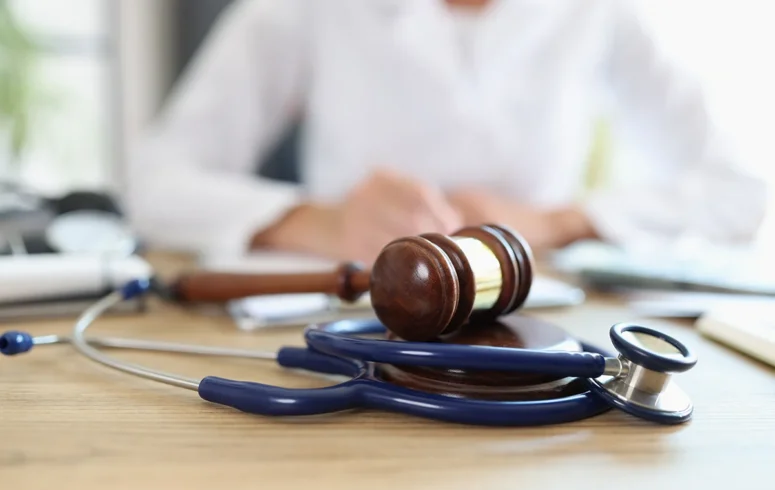Biomedical & Life Science Fraud
Providing Crucial Support to Patients and Consumers Harmed by Fraudulent Activities in Medicine, Biology, and Related Sciences.
Contact Simon Law to schedule your free case evaluation.
Biomedical & Life Science Fraud Attorneys at Simon Law
Deceptive practices within the medical and scientific fields, such as false claims, manipulated clinical trial data, and marketing unapproved products, can lead to serious harm. At Simon Law, our experienced attorneys are committed to representing plaintiffs who have been adversely affected by such fraud.
We offer comprehensive legal support, from investigating and gathering crucial evidence to filing lawsuits and seeking compensation for damages. With our in-depth understanding of the regulatory landscape and a track record of successful outcomes, we are ready to advocate fiercely on your behalf to ensure justice and hold wrongdoers accountable.

About Biomedical & Life Science Fraud
Biomedical and life science fraud involves deceptive practices in the medical and scientific fields. Some of these practices may include falsifying clinical trial data, submitting false claims for reimbursement, promoting unapproved products, and more. Unfortunately, these fraudulent activities can lead to serious harm to patients and undermine the integrity of scientific research. Unethical practices and misconduct may be a result of a pressure and need for additional funding, wasteful publication in pursuit of publishing more articles that create a misleading research study count, the desire to hide negative results, or to make the results fit the hypothesis.
How Can I Determine If I Have Been a Victim of Biomedical & Life Science Fraud?
Determining if you have been a victim of biomedical and life science fraud involves several steps:
- Review your medical records and billing statements: Check for discrepancies in your medical records or billing statements. Look for services or treatments that you did not receive, incorrect billing codes, or unexpected charges.
- Assess treatment outcomes: If you’ve experienced adverse effects from a medical treatment, drug, or device, it’s worth investigating further. Compare your experience with the documented benefits and risks of the treatment.
- Verify clinical trial information: If you participated in a clinical trial, review the trial’s published results and compare them to your own experiences. Look for inconsistencies or evidence that the trial data may have been manipulated.
- Check for regulatory approvals: Ensure that any medical products or treatments you’ve used are apporved by relevant regulatory agencies, such as the FDA. Unapproved or experimental products may indicate fraud.
- Consult with experts: Seek advice from healthcare professionals, legal experts, or patient advocacy groups. They can help you understand whether your situation involves fraudulent practices and guide you on the next steps.
- Report and investigate: If you suspect fraud, report it to the appropriate regulatory bodies or seek legal counsel. An experienced attorney can assist in investigating the matter, gathering evidence, and determining if legal action is warranted.
Taking these steps can help you identify potential fraud and ensure that you take appropriate actions to protect your rights and seek justice.
Who Can Be Affected by Biomedical & Life Science Fraud?
Biomedical and life science fraud can have far-reaching impacts, affecting a variety of individuals and organizations:
- Patients: Patients can suffer the most direct and severe consequences, including physical harm, adverse health effects, and financial losses due to fraudulent treatments, drugs, or medical devices.
- Healthcare providers: Doctors, nurses, and other healthcare may inadvertently administer unsafe or ineffective treatments, leading to potential harm to their patients and legal liabilities.
- Research institutions: Universities and research organizations can face reputational damage, loss of funding, and legal repercussions if involved in or associated with fraudulent research practices.
- Pharmaceutical and medical device companies: Companies that manufacture drugs or medical devices can be significantly impacted by fraud within their ranks, leading to financial losses, regulatory penalties, and damage to their credibility and market position.
- Insurance companies: Health insurers may incur substantial financial losses due to false claims or billing fraud, leading to increased premiums and costs for policyholders.
- Regulatory agencies: Organizations like the FDA or NIH, tasked with overseeing the safety and efficacy of medical products and research, can face challenges in maintaining public trust and effectively regulating the industry if fraud is widespread.
- Investors: Investors in biotech and pharmaceutical companies can experience financial losses due to fraud, which can lead to a decline in stock value and overall market instability.
- Public trust: Widespread fraud undermines public confidence in the healthcare system, scientific research, and regulatory bodies, making it harder for legitimate advancements to gain acceptance and for public health initiatives to succeed.
- Whistleblowers: Individuals who report fraud may face retaliation or legal battles, though they are often crucial in uncovering and addressing fraudulent activities.
In short, biomedical and life science fraud can have broad and serious implications, affecting many sectors of society and the economy, and it underscores the need for vigilance and integrity in these fields.
What Are Some Examples of Biomedical & Life Science Fraud?
Biomedical and life science fraud can take various forms, impacting patients, healthcare systems, and scientific integrity. Some common examples include:
- Falsifying clinical trial data: Manipulating or fabricating data in clinical trials to show positive results for drugs or medical devices that are not actually effective or safe. This can lead to the approval and use of harmful products.
- Billing fraud: Submitting false claims to insurance companies or government healthcare programs for services that were never provided, exaggerating the complexity of services rendered, or billing for unnecessary procedures.
- Promoting unapproved products: Marketing and selling medical treatments, drugs, or devices that have not been approved by regulatory agencies like the FDA. This can expose patients to untested and potentially dangerous interventions.
- Kickbacks and bribery: Offering or accepting bribes to influence medical decisions, such as prescribing certain drugs or using specific medical devices, compromising the integrity of medical care.
- Ghostwriting in scientific publications: Hiring writers to produce research papers that are then attributed to reputable scientists or clinicians who did not actually conduct the research, misleading the scientific community and public.
- Overbilling and upcoding: Charging for more expensive services or higher levels of care than were actually provided, or misclassifying procedures to receive higher reimbursements from insurers.
- Stealing intellectual property: Illegally obtaining and using proprietary research, technology, or data from other organizations, undermining innovation and violating intellectual property rights.
- Patient recruitment fraud: Falsifying patient information or recruiting ineligible participants for clinical trials to meet enrollment targets, which can compromise the validity of the trial results.
- Use of substandard materials: Utilizing inferior or counterfeit materials in the production of medical devices or drugs, leading to ineffective or harmful products being distributed in the market.
These examples highlight the importance of vigilance, ethical standards, and regulatory oversight to protect public health and maintain scientific integrity.
How Can Individuals Report Suspected Biomedical & Life Science Fraud?
If you suspect biomedical and life science fraud, taking prompt action is crucial. Here are steps you can take to report your concerns:
- Contact regulatory agencies: Report your suspicions to relevant regulatory bodies. In the United States, this includes agencies such as:
- The Food and Drug Administration (FDA) for issues related to drugs, medical devices, and clinical trials. They have a dedicated reporting system called MedWatch.
- The Office of Inspector General (OIG) of the Department of Health and Human Services (HHS) for Medicare and Medicaid fraud.
- Utilize whistleblower programs: Many regulatory agencies offer whistleblower programs that protect individuals who report fraud. These programs often allow anonymous reporting and can provide legal protections and financial rewards for whistleblowers.
- The False Claims Act allows individuals to file lawsuits on behalf of the government for fraudulent claims and receive a portion of any recovered funds.
- Report to healthcare institutions: If the suspected fraud involves a hospital, clinic, or research institution, report your concerns to their compliance or ethics office. Most institutions have internal mechanisms for investigating and addressing fraud.
- Seek legal counsel: Consult with an attorney who specializes in biomedical and life science fraud. They can guide you through the reporting process, help you gather evidence, and ensure your rights are protected.
- Contact professional associations: Report fraud to relevant professional associations, such as the American Medical Association (AMA) or other industry-specific organizations. These bodies often have codes of conduct and can take disciplinary action against members.
- File a complaint with the Federal Trade Commission (FTC): For issues related to consumer fraud, such as false advertising of medical products, you can file a complaint with the FTC.
- Use online reporting tools: Many regulatory and oversight agencies provide online tools and hotlines for reporting fraud. These platforms allow you to submit detailed information and any supporting evidence you may have.
By following these steps, individuals can help uncover and address fraudulent activities in the biomedical and life sciences, contributing to the protection of public health and the integrity of scientific research.
How Can Organizations Protect Themselves from Biomedical & Life Science Fraud?
Organizations in the biomedical and life sciences fields can take several proactive steps to protect themselves from fraud:
- Implement robust compliance programs: Establish and maintain comprehensive compliance programs that adhere to industry regulations and standards. These programs should include clear policies and procedures for detecting, preventing, and responding to fraud.
- Conduct regular audits: Perform regular internal and external audits to review financial transactions, clinical trial data, and research practices. Audits help identify irregularities and ensure adherence to regulatory requirements
- Provide employee training: Educate employees about the importance of ethical behavior and compliance with laws and regulations. Training should cover recognizing and reporting fraudulent activities, as well as understanding the legal and ethical standards of the industry.
- Establish clear reporting mechanisms: Create secure and anonymous channels for employees, patients, and other stakeholders to report suspected fraud. Whistleblower protections should be in place to encourage reporting without fear of retaliation.
- Enforce strong internal controls: Develop and enforce strong internal controls to monitor financial transactions, billing practices, and research activities. This includes segregation of duties, approval processes, and verification procedures.
- Perform background checks: Conduct thorough background checks on employees, contractors, and business partners. Verify their credentials, employment history, and any past involvement in fraudulent activities.
- Engage legal and compliance experts: Work with legal and compliance experts to stay informed about regulatory changes and emerging risks. These experts can provide guidance on best practices for fraud prevention and response.
- Foster a culture of transparency and integrity: Promote a corporate culture that values transparency, integrity, and accountability. Leadership should set the tone by demonstrating ethical behavior and emphasizing the importance of compliance.
- Monitor and analyze data: Use data analytics and monitoring tools to detect patterns or anomalies that may indicate fraudulent activity. This can include monitoring billing patterns, clinical trial data, and financial transactions.
- Develop a fraud response plan: Prepare a comprehensive fraud response plan that outlines the steps to take if fraud is detected. This plan should include immediate actions to contain the fraud, an investigation process, and communication strategies.
By taking these measures, organizations can reduce the risk of biomedical and life science fraud, protect their reputation, and ensure compliance with industry regulations and ethical standards.
What Types of Damages Can I Recover in a Biomedical & Life Science Fraud Case?
In a biomedical and life science fraud case, plaintiffs may be entitled to various types of damages, depending on the specifics of their situation and the extent of harm suffered. These damages include:
- Medical expenses: Compensation for past and future costs incurred due to the fraudulent activities. This can cover hospital bills, surgeries, medications, rehabilitation, and any other necessary medical treatments.
- Lost wages: Reimbursement for lost income due to inability to work because of the harm caused by the fraud. This includes both past and future lost wages if the injury or illness has long-term effects on the plaintiff’s ability to earn a living.
- Pain and suffering: Damages for the physical pain and emotional distress experienced as a result of the fraud. This compensation aims to address the non-economic impact of the harm, such as ongoing pain, mental anguish, and loss of enjoyment of life.
- Loss of consortium: Compensation for the negative impact on personal relationships, particularly the loss of companionship and support from a spouse or family member due to the harm caused by the fraud.
- Punitive damages: in cases where the defendant’s actions are found to be particularly egregious or malicious, the court may award punitive damages. These are intended to punish the wrongdoer and deter similar conduct in the future.
- Legal fees and costs: Reimbursement for the plaintiff’s legal expenses, including attorney fees, court costs, and other related expenses incurred while pursuing the case.
- Compensation for permanent disability or disfigurement: If the fraud results in long-term or permanent physical impairment or disfigurement, the plaintiff may receive additional compensation to address the impact on their quality of life and ability to function.
- Out-of-pocket expenses: Reimbursement for any other direct expenses related to the fraud, such as transportation costs for medical treatment, home modifications for disability accommodation, or other necessary expenditures.
The specific damages recoverable will depend on the details of the case, including the nature and extent of the harm suffered. Consulting with an experienced attorney can help plaintiffs understand their rights and the potential compensation they may be entitled to receive.
Meet Our Dedicated Team of Attorneys
When you need qualified and reliable guidance, you know where to turn. Simon Law is ready to listen to your story and review the complex aspects of your case.










Contact Our Firm Today
Our mission is to provide the highest-quality legal services with integrity, professionalism, and respect for our clients. Simon Law has the resources and expertise to handle your case without sacrificing the personalized counsel and support you deserve.